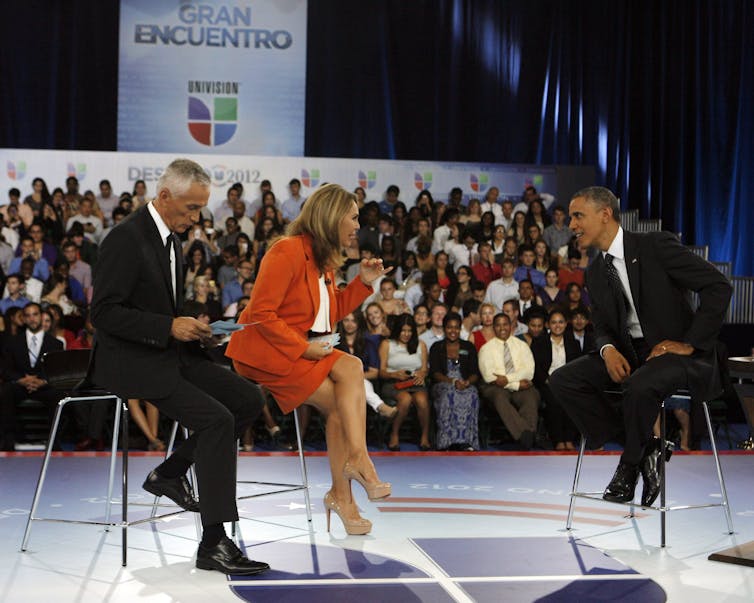
Arizona sits in the southwestern corner of the United States. It is a desert region interspersed with mountain pine forests and impressive geological features such as, well, you know. Other than outlying Alaska and Hawaii, which didn’t become states until around 1960, Arizona was the very last territory in America to attain statehood, joining the Union just 100 years ago. Despite its relative youth, the Grand Canyon State has already produced two presidential nominees, Republicans Barry Goldwater (1964) and John McCain (2008).
But it is what Arizona has not thus far produced that makes it the most overlooked story of the 2012 elections and should be giving Republicans cause for celebration despite what appear to be worsening electoral fortunes: there does not appear to be a Hispanic Democratic wave rising in Arizona. The southwest remains a relatively conservative region of swing states in the face of Republican-sponsored anti-Hispanic legislation, despite the fact that a similar measure turned California from the land of Nixon and Reagan into a Democratic bastion in less than a decade.
The story of the dog that has not barked began in 2009, when President Obama selected Democratic Governor Janet Napolitano to serve as Secretary of Homeland Security, thus elevating Republican Jan Brewer to the vacant governorship. Brewer was seen initially as a mere place holder until the next elections. But then she signed into law Senate Bill (SB) 1070, legislation passed by the Republican state legislature but vetoed in the past by Napolitano. The measure states that the federal government has failed to curb illegal immigration, and therefore law enforcement officers in Arizona have the authority to detain anyone whom they have reason to suspect might be an illegal immigrant and demand to see their documentation. Hispanic advocates were furious, arguing that the law was intended to discriminate against brown people (who else would be stopped?).
Arizona is a conservative state. Brewer was elected handily in the Republican wave year of 2010, although the Bill’s sponsor, State Senator Russell Pearce, later became the first state senate president in America recalled from office by special election. (Voters replaced him with a moderate Republican whom Hispanic leaders supported as a way to keep the conservative area seat out of Pearce’s hands.)
Other results were noticeable in neighbouring states: in the swing-states of Nevada and Colorado, incumbent Democratic senators who had spent the year behind in the polls beat back Tea Party challengers on election night in 2010 because of much higher than forecast Hispanic turnout.
Many Democrats hoped, and Republicans feared, that SB 1070 would galvanise the growing Hispanic-American population into becoming active, voting Democrats and that Arizona would turn blue in 2012. This is exactly what happened in California in the 1990s in response to another measure, Proposition 187, which was supported very visibly by the state’s Republican governor at the time, that would have denied all public services, including schools and hospital emergency rooms, to undocumented immigrants. The rapidly growing Golden State Hispanic electorate awoke, and celebrity Arnold Schwarzenegger has been the only Republican elected to statewide office since the mid-1990s, while Congressional seats in former conservative strongholds such as Orange County are now reliably Democratic (and represented in Washington by Hispanics.) By contrast, the Republicans who dominate Texas politics and who also face a large, presently non-voting Hispanic population, have taken great care not to give it a reason to become active politically, and they have continued to win every statewide race in the Lone Star State for the last 20 years.
Hispanic-Americans now constitute around 15% of the population of the United States. They have become the second largest ethnic demographic in the country and their numbers are still growing. They have been voting about 2-1 for Democrats, but they are still voting at low rates compared to their share of the population. The sense in both parties is that within a couple of generations they will vote at rates comparable to Caucasians, but that this might be accelerated if they feel attacked, as in 1990s California.
Thus far, however, Barack Obama continues to run well behind in the polls in Arizona, and the state’s open Senate race probably favours the Republican candidate. In surrounding states, while Obama and the Democratic Senate candidate appear to be running away with New Mexico, Colorado is merely tied at the presidential level, and Nevada seems split, with Obama holding a narrow lead while the Republican Senate candidate does as well.
As of late September, things are not going well for Republicans nationally, or in key races. Obama looks more likely than ever to win, and it appears ever more doubtful that Republicans will capture the Senate this year despite more favourable races for them. Even their tremendous money advantage in the era of the Supreme Court decision that corporations have free speech rights appears to be making little difference in 2012.
But for all of this, there is one fundamental that has not shifted against them: The Hispanic giant has not awakened in the southwest. For now, the grand canyon between demography and destiny remains.
